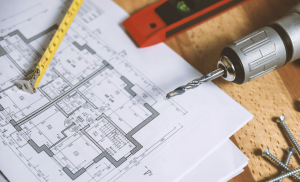How to Organize a Cost- and Time-Efficient Home Renovation
Embarking on a home renovation project can be an exciting yet daunting endeavor. From the initial spark of inspiration to the final coat of paint, every step requires careful planning and execution to ensure a successful outcome that saves both time and cost. In this guide, I will walk you through the stages of organizing a home renovation in a way that maximizes efficiency without compromising on quality.
 1. Define Your Goals and Budget:
1. Define Your Goals and Budget:
Before diving into any renovation project, it’s crucial to clearly define your goals. Are you looking to create more space, enhance functionality, or simply update the aesthetics? Once your goals are established, set a realistic budget that covers all expenses including materials, labor, permits, and unexpected contingencies. Having a well-defined budget will guide your decisions throughout the process and help you avoid overspending.
2. Plan and Design:
Engage in thoughtful planning and design to avoid mid-project changes that can increase costs and prolong the timeline. Work with an architect or a designer to create detailed plans and drawings. This step allows you to visualize the result, make informed decisions, and obtain accurate estimates from contractors.
3. Secure Approvals and Permits:
Before beginning any significant renovations, it’s essential to check with your local authorities to determine whether your project requires approvals or permits. Depending on the scope of the work, you may need permits for structural changes, electrical and plumbing work, and even aesthetic alterations in some cases. Failing to secure the proper permits can result in fines, project delays, and even legal consequences.
Research Local Regulations:
Different regions and municipalities have varying regulations and requirements when it comes to renovations. Research your local building codes and zoning regulations to understand what is permissible. This step is crucial in ensuring that your renovation is compliant with legal standards.
Consult with Professionals:
Engage with your architect, designer, or contractor to understand the specific permits and approvals necessary for your project. They often have experience in navigating local regulations and can guide you through the process. Additionally, they might help you prepare the required documentation for permit applications.
Submit Applications Early:
Once you’ve identified the necessary permits, submit your applications as early as possible. Permit processing can take time, and you wouldn’t want to start your renovation only to be held up due to pending approvals. Starting the permit process early helps you avoid delays in the construction phase.
Follow Guidelines Precisely:
When obtaining permits, it’s crucial to adhere to the guidelines set by your local authorities. Deviating from approved plans without proper authorization can lead to serious consequences, including having to undo work or pay fines. Regular inspections during construction ensure that you’re meeting the necessary standards.
Consider Professional Help:
If navigating the permit process seems overwhelming, you might consider hiring a permit expeditor or consultant. These professionals specialize in dealing with permit applications and can help expedite the process while ensuring compliance.
Factor in Time and Budget:
Obtaining permits takes time, so make sure to factor this into your renovation timeline. Additionally, some permits come with fees, which need to be accounted for in your budget. Including these costs and timeframes from the outset prevents unexpected delays and financial strain.
By including the permit and approval process in your home renovation planning, you adhere to legal requirements and ensure that your project proceeds smoothly without unnecessary hitches. Remember that obtaining permits is not just a legal necessity; it’s a crucial step toward ensuring the safety and quality of your renovation project.
 4. Obtain Multiple Bids:
4. Obtain Multiple Bids:
When selecting contractors, don’t settle for the first bid that comes your way. Reach out to multiple contractors and obtain detailed quotes for the project. This not only helps you compare prices but also allows you to evaluate their expertise, professionalism, and compatibility with your vision.
5. Prioritize Phases:
Breaking down your renovation into phases can help manage costs and time more effectively. Prioritize critical phases, such as structural work or major installations, to be completed first. This prevents delays caused by unexpected issues that might arise during these crucial stages.
6. Consider DIY Where Applicable:
Depending on your skill set and the complexity of the project, consider tackling certain tasks yourself. DIY efforts can significantly cut costs, especially for simpler tasks like painting, landscaping, or minor repairs. Just ensure you’re well-equipped and knowledgeable before diving in.
7. Efficient Material Selection:
Choosing the right materials can have a big impact on both cost and time. Opt for quality materials that are within your budget to avoid future repairs. Additionally, consider materials that are easy to install, as this can expedite the renovation process.
8. Flexibility and Contingency:
No matter how meticulous your planning is, unexpected challenges may arise. Set aside a contingency fund of around 10-20% of your budget to address any unforeseen issues without derailing the entire project. This ensures you’re prepared for the unexpected without compromising on your renovation goals.
9. Clear Communication:
Open and clear communication with your contractors is vital. Regularly scheduled meetings or updates allow you to address any concerns promptly and make adjustments if needed. Miscommunication can lead to mistakes that could increase costs and cause delays.
 10. Stick to the Plan:
10. Stick to the Plan:
During the renovation process, it’s easy to get carried away with additional changes or upgrades that weren’t part of the original plan. While some flexibility is okay, straying too far from the initial design can lead to increased costs and extended timelines. Keep your goals and budget in mind.
11. Final Inspections:
Before considering the renovation complete, ensure that all necessary inspections are carried out. This includes permits, structural assessments, and safety checks. Ignoring these steps could lead to costly revisions down the line.
12. Celebrate the Success:
Upon completion, take the time to appreciate your newly renovated space. Whether it’s a room, an entire floor, or your entire home, your hard work and careful planning have culminated in a space that reflects your vision.
In conclusion, organizing a home renovation that saves both time and cost requires a combination of thorough planning, clear communication, and careful execution. By defining your goals, creating a realistic budget, and following these steps, you’ll be well on your way to achieving a successful renovation that enhances your living space while keeping expenses and time investment in check.
n

